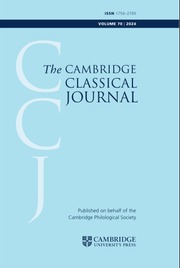No CrossRef data available.
Article contents
GLOSSING ACHILLES: HORACE, EPODE 13
Published online by Cambridge University Press: 15 June 2015
Abstract
This paper argues that the final couplet of Horace, Epode 13 alludes both to the description of Achilles playing the lyre in Iliad 9 and to ancient scholarly debate about the Homeric passage. Horace's reworking of the Iliad underlines his transfer of epic material to a sympotic setting, and the scholarly allusion reinforces Horace's presentation of himself as a symposiastic speaker by drawing on the tradition of symposia as sites of learned conversation. This dual engagement with Homer encourages readers to see their own responses to Horace's poem as part of a continuum of literary debate.
- Type
- Research Article
- Information
- Copyright
- Copyright © The Author(s) 2015. Published by Cambridge University Press


